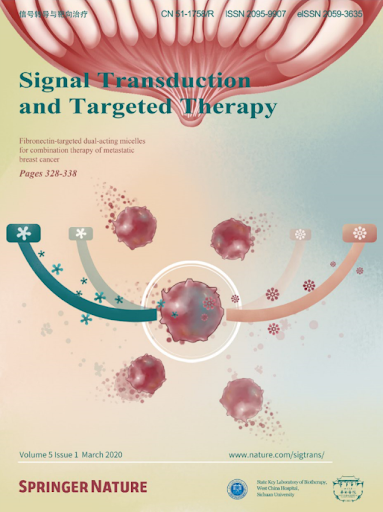Acevaltrate as a novel ferroptosis inducer with dual targets of PCBP1/2 and GPX4 in colorectal cancer.
IF 40.8
1区 医学
Q1 BIOCHEMISTRY & MOLECULAR BIOLOGY
引用次数: 0
Abstract
Ferroptosis induced by ferrous ions (Fe2+) and lipid peroxidation accumulation is a novel form of regulated cell death that has become a hot topic in tumor therapy research. Identifying small-molecule drugs that can induce ferroptosis in tumor cells is a very attractive therapeutic strategy. Here, we screened a natural product, acevaltrate (ACE), which rapidly and strongly induces ferroptosis in colorectal cancer cells. ACE not only increases Fe2+ levels in colorectal cancer cells by targeting iron chaperones PCBP1/2 and reducing their expression but also disrupts the antioxidant system of colorectal cancer cells by targeting GPX4 and inhibiting its enzymatic activity, leading to its ubiquitin-mediated degradation. This dual effect of ACE makes it significantly more effective than classical ferroptosis inducers in inducing ferroptosis. Our animal experiments revealed that the therapeutic effect of ACE surpasses that of established ferroptosis-inducing drugs and is superior to that of first-line clinical drugs such as capecitabine and TAS-102. Importantly, ACE also demonstrated superior inhibitory effects in colorectal tumor organoids versus at the cellular level, underscoring its potential for clinical application. This study pioneers the discovery of a small molecule inhibitor that targets both PCBP1/2 and GPX4, offering a novel therapeutic strategy for eliminating cancer cells through ferroptosis. Acevaltrate (ACE) was identified as a potent inducer of ferroptosis in colorectal cancer cells. ACE increases Fe2+ levels by targeting PCBP1/2 and disrupts the antioxidant system by inhibiting GPX4, leading to its degradation. This dual action makes ACE more effective at inducing ferroptosis than traditional inducers. Our study introduces ACE as the first small-molecule inhibitor of PCBP1/2 and GPX4, offering a new therapeutic approach for cancer cell elimination through ferroptosis.Acevaltrate作为结直肠癌中具有PCBP1/2和GPX4双重靶点的新型铁下垂诱导剂。
铁离子(Fe2+)和脂质过氧化积累诱导的铁死亡是一种新的细胞死亡形式,已成为肿瘤治疗研究的热点。寻找能够诱导肿瘤细胞铁下垂的小分子药物是一种非常有吸引力的治疗策略。在这里,我们筛选了一种天然产物,acevaltrate (ACE),它能快速而强烈地诱导结直肠癌细胞铁下垂。ACE不仅通过靶向铁伴侣PCBP1/2并降低其表达来提高结直肠癌细胞中Fe2+的水平,而且通过靶向GPX4并抑制其酶活性来破坏结直肠癌细胞的抗氧化系统,导致其泛素介导的降解。ACE的这种双重作用使其在诱导铁下垂方面明显优于经典的铁下垂诱导剂。我们的动物实验表明,ACE的治疗效果超过了现有的诱导铁死亡的药物,也优于卡培他滨、TAS-102等一线临床药物。重要的是,ACE在结直肠肿瘤类器官中也表现出优于细胞水平的抑制作用,强调了其临床应用潜力。本研究率先发现了一种靶向PCBP1/2和GPX4的小分子抑制剂,为通过铁凋亡消除癌细胞提供了一种新的治疗策略。Acevaltrate (ACE)被鉴定为结直肠癌细胞铁下垂的有效诱导剂。ACE通过靶向PCBP1/2增加Fe2+水平,并通过抑制GPX4破坏抗氧化系统,导致其降解。这种双重作用使得ACE比传统诱导剂更有效地诱导铁下垂。本研究首次引入ACE作为PCBP1/2和GPX4的小分子抑制剂,为通过铁凋亡消除癌细胞提供了新的治疗途径。
本文章由计算机程序翻译,如有差异,请以英文原文为准。
求助全文
约1分钟内获得全文
求助全文
来源期刊

Signal Transduction and Targeted Therapy
Biochemistry, Genetics and Molecular Biology-Genetics
CiteScore
44.50
自引率
1.50%
发文量
384
审稿时长
5 weeks
期刊介绍:
Signal Transduction and Targeted Therapy is an open access journal that focuses on timely publication of cutting-edge discoveries and advancements in basic science and clinical research related to signal transduction and targeted therapy.
Scope: The journal covers research on major human diseases, including, but not limited to:
Cancer,Cardiovascular diseases,Autoimmune diseases,Nervous system diseases.
 求助内容:
求助内容: 应助结果提醒方式:
应助结果提醒方式:


